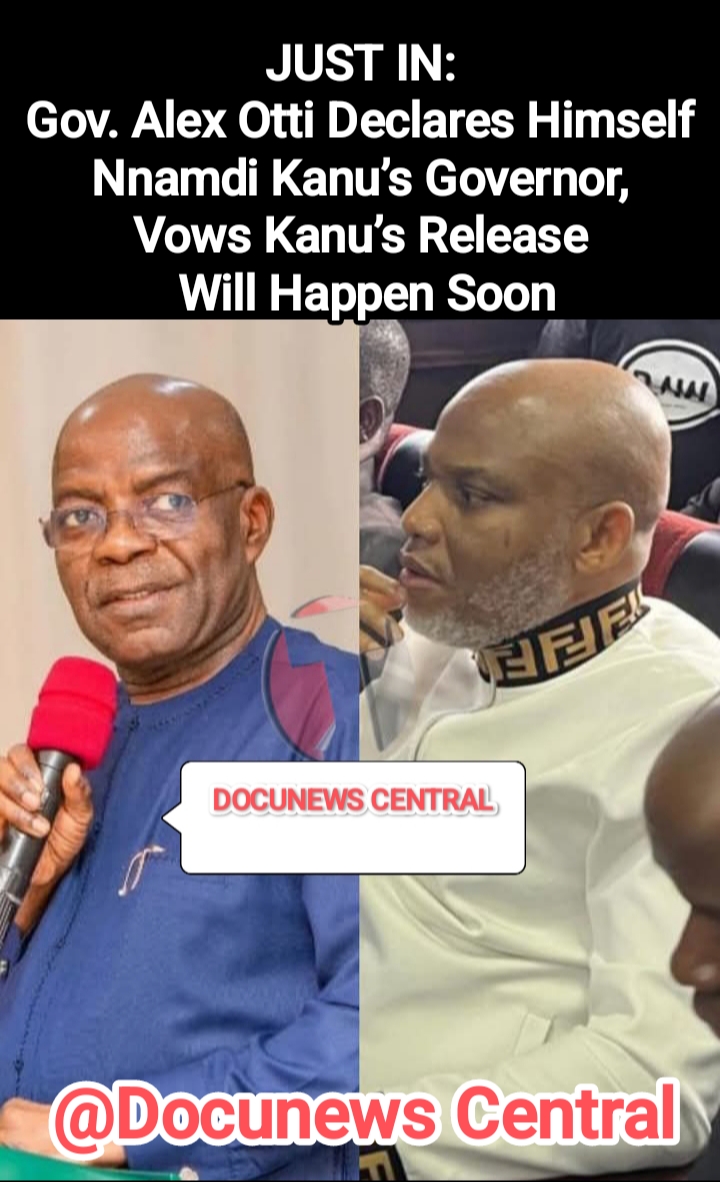

JUST IN: Gov. Alex Otti Declares Himself Nnamdi Kanu’s Governor, Vows Kanu’s Release Will Happen Soon
Abia State Governor, Dr. Alex Otti, has set the political scene abuzz with a bold and passionate declaration regarding the fate of Mazi Nnamdi Kanu, the detained leader of the Indigenous People of Biafra (IPOB). In a recent media interaction in Umuahia, the Abia State capital, Governor Otti openly described himself as “Mazi Nnamdi Kanu’s governor,” and promised that securing Kanu’s freedom will no longer take much time.
This rare and striking statement has quickly drawn nationwide attention, stirring emotions among supporters of Kanu, political observers, and ordinary Nigerians who have closely followed the long-running saga of the IPOB leader’s detention.
Otti’s Bold Assurance
Governor Otti told journalists that efforts are actively underway to secure the immediate release of Nnamdi Kanu, who has been in the custody of the Department of State Services (DSS) since 2021 following his arrest and extradition to Nigeria.
“I consider myself as Mazi Nnamdi Kanu’s governor,” Otti said during the session. “And I want to assure you that securing his release will no longer take much time.”
The governor stressed that the matter has gone beyond political rhetoric, explaining that South East governors have intensified engagement with key national authorities to bring an end to Kanu’s detention. According to him, consultations with the Federal Government and relevant security agencies are ongoing and have reached an encouraging stage.
Background to the Detention
Mazi Nnamdi Kanu, founder and leader of IPOB, was first arrested in 2015 on charges of treasonable felony and other offenses linked to his calls for an independent Biafran state. After being released on bail in 2017, Kanu fled the country when military operations in the South East escalated.
In June 2021, he was dramatically re-arrested abroad and brought back to Nigeria. Since then, he has been held in DSS custody in Abuja, with his legal team repeatedly seeking bail and arguing that his continued detention violates his fundamental human rights.
The matter has been a flashpoint for political and ethnic tension, especially in the South East, where many residents view Kanu as a symbol of their struggle for political recognition and equity in Nigeria’s federal structure.
Significance of Otti’s Words
Governor Otti’s comments carry major political weight because he is not just a regional figure but also the sitting governor of the very state where Kanu hails from—Abia State.
By calling himself “Kanu’s governor,” Otti signaled a direct personal commitment to the case, positioning himself as a key voice of the Igbo people in pressing for Kanu’s release. This is not mere political theater; it is a statement likely to shape the relationship between the South East and the Federal Government in the coming months.
Political analysts believe Otti’s words could strengthen pressure on Abuja to find a political solution to the long-running IPOB dispute. Many have argued that Kanu’s release is essential to calming security concerns and violent agitations that have occasionally rocked the South East.
Reaction Across the South East
News of Otti’s pledge has already triggered a wave of reactions across Abia State and the wider South East. Supporters of Nnamdi Kanu see the governor’s statement as a ray of hope in a case that has dragged on for years without a definite conclusion.
Members of pro-Biafra movements welcomed the governor’s stance, saying it reflects the sentiment of the majority of the region. Social media platforms quickly lit up with messages praising Otti’s courage and urging other political leaders to make similar commitments.
One prominent Igbo elder who spoke to local journalists said, “Governor Otti has spoken the mind of the people. The continued detention of Mazi Nnamdi Kanu has created tension for too long. It is time for dialogue, and we commend the governor for taking this bold position.”
The Federal Government’s Role
Despite mounting calls for Kanu’s release, the Federal Government has maintained that his trial must follow due process. Officials have repeatedly insisted that national security concerns remain a key factor in the case.
Governor Otti’s latest remarks, however, underscore a growing consensus among South East leaders that a political resolution is preferable to a protracted legal battle. The governor hinted that quiet but significant conversations are already underway with Abuja, though he stopped short of revealing details.
“I can tell you that talks are ongoing,” he said. “We are engaging relevant authorities, and I am optimistic that this will no longer take much time. Our people need peace and justice, and this is the first step toward that.”
Broader Implications for Nigeria
The governor’s comments arrive at a critical time for Nigeria’s unity and stability. The question of Nnamdi Kanu’s detention has fueled protests, security challenges, and periodic lockdowns known as “sit-at-home” in the South East.
Many analysts believe that Kanu’s release, if achieved, could help reduce tensions and open new channels for dialogue between the Federal Government and pro-Biafra sympathizers.
Governor Otti’s proactive approach may also set a precedent for other regional leaders to use political negotiation rather than confrontation in addressing separatist grievances.
Awaiting Abuja’s Response
As of now, the Federal Government has not issued any official response to Governor Otti’s latest statement. It remains to be seen whether his bold public assurance will accelerate talks or spark fresh debate over the legal and security dimensions of Kanu’s case.
However, Otti’s words have undoubtedly raised expectations. For many in the South East, the governor’s remarks are not just political promises—they represent a long-awaited step toward justice and reconciliation.
Governor Alex Otti’s declaration that he is “Mazi Nnamdi Kanu’s governor” and his assurance that Kanu’s release will soon be secured has shifted the spotlight squarely back onto the Federal Government and Nigeria’s judiciary. Whether Abuja will match Otti’s optimism with action in the coming weeks will determine whether this dramatic pledge becomes reality or remains yet another political flashpoint in the nation’s ongoing struggle for unity and peace.






